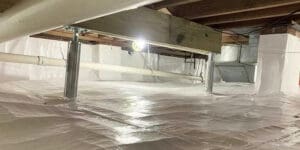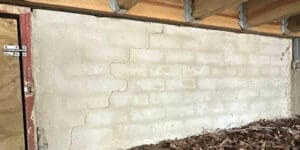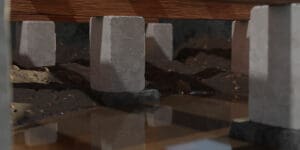Wall anchor systems permanently stabilize your basement walls, giving you the best chance to straighten them without the expense and disturbance of a full foundation replacement.
Galvanized earth anchors are ingrained in stable, undisturbed soil outside your foundation wall. A steel rod connects each anchor to a wall plate, which provides tensioning pressure on the inside of the foundation wall. This method may also return the wall back to its original position.
What Are Wall Anchors?
A foundation wall anchor is a steel plate that uses the surrounding soil to pull the failing wall back into place and stabilize the structure permanently. These plates are suitable for residential and commercial facilities.
Foundation problems occur in a variety of ways. The most frequent is for walls to settle downward as the soil compresses, but walls can also bend inward lean as the neighboring soil adds pressure to the wall. This is also prevalent when trees and bushes expand too close to the foundation and roots place pressure the foundation wall. Faulty design or expansive soils can also cause bowing.
When a foundation wall starts to bow, crack, or bend, it is critical to stabilize it to avoid further motion and prevent catastrophic failure. Once stabilized, the wall can withstand much more stress. Without repairs, the wall may continue to bow inward and eventually fail, compromising the structural integrity of your entire home. In addition, the wall anchors, once installed, can be tightened over time to help rectify wall bowing.
Watch our video to learn more.

What Are Wall Anchor Systems Used For?
While there are several possible causes of cracked and bowing foundation walls, the force from foundation soils is the most common. When clay soils become wet, they expand and exert enormous pressure on walls. When the force on the wall exceeds its ability to withstand it, the wall begins to fail in various ways. The most common signs of foundation wall failure are cracking, bowing, and tilting.
Heavy rains (which cause hydrostatic pressure) and exterior slabs such as driveways or porches, which exert strain on the wall by expanding in a hot climate, are also factors in foundation wall damage. Foundation damage can also be caused by large tree roots, frost-induced soil expansion, and problems related to poor grading.
The primary issue with foundation soil is that even though the earth is constantly pressing onto the outside of the walls, hardly anything on the inside equalizes the pressure. Wall anchors address this issue by “grabbing” the inside surface of the wall and combating stress.
These anchors extend beyond your home to the steady, tightly-packed soil beyond, anchoring themselves and gearing up the foundation wall. This completely stops inward movement, and tightening the wall anchors over time can even reposition your foundation walls back to the initial position.
When Should Wall Anchors Be Installed?
Wall anchors are the most versatile wall repair method because they can stabilize walls with many issues, such as bowing, turning, and bottom-pushing. In addition, wall anchors are installed separately from a home’s floor systems, making it the perfect installation under certain conditions.
A wall anchor system by requires several feet of connectivity on the outside of your home to function properly. Therefore, wall anchors are not an option in areas where homes are just a few feet apart. However, if this is the scenario in your situation, our foundation repair team will suggest another foundation wall repair option.
Will a Wall Anchor Straighten a Basement Wall?
The primary objective of wall anchors is to provide stability to your wall. The use of wall anchors to straighten a wall, whether entirely or partially, is dependent on your house and its construction. Our installation team has fixed many walls with anchors. They will assess the movement of the wall and halt when the required torque is attained. This could mean that your wall is only mildly bowed or still as bowed as it was when they started.
If you want to get the wall back to 100 percent plumb (perfectly vertical), you should have it straightened. More excavation directly outside your foundation is required for wall straightening. Once the exterior of the wall has been exposed, hydraulic jacks are installed within the basement to reposition it. After being straightened, it is reinforced with wall anchors or carbon fiber straps.
Benefits of Wall Anchors
STRONG
Wall anchors are strong enough to bring even the most severely weakened walls back from the brink of collapse. Wall anchors are placed into the soil around the property and then linked by flexible steel rods that run in the wall to an interior plate, in which they are tightened. The anchor force neutralizes the weakening pull on the opposite side, gradually but steadily restoring the wall to a functional position.
LESS EXPENSIVE
Installing wall anchors takes less time than other foundation repair methods. They are less expensive and less destructive than redoing faulty walls, which can entail raising an entire house. Wall anchors are also low-maintenance, so keeping them in good condition will be much less expensive.
LOW ENVIRONMENTAL IMPACT
Wall anchors are one of the minor invasive processes of foundation repair. In many cases, they can restore stability to the affected area while causing minimal disruption to the wall, the larger property, or the surrounding land.
ADAPTABLE APPLICATION
Basement walls come in various materials, including concrete and stone, wood, and clay. Wall anchors are equally effective on all of these surfaces and can be fitted at any time of year, generally in less than a day.
Schedule A Free Inspection Today
Whether you suspect you might have foundation issues or you know your basement walls are bowing, we can help! Our team has years of experience with diagnosing and correcting foundation, crawl space, and basement issues.
Contact us today or give us a call at 704-741-9737 to schedule a free inspection. Our specialist will thoroughly review your basement or foundation, walk you through their findings and recommend a solution that’s right for you.
WHY CHOOSE WALL ANCHORS FOR FOUNDATION STABILIZATION?
Our wall anchors are proven, warrantied, and corrosion-resistant. Foundation wall anchors installed beyond your home in the steady, hard-packed soil, aligning themselves and bracing the foundation wall. This completely stops inward movement, and tightening these anchors over time can even relocate your foundation walls back to the initial position.
Our wall anchor installations are intended to be completed quickly and with as little disruption to your home and landscaping as possible. Therefore, many repairs can be completed in a single day. One of our in-house foundation contractor crews installs wall anchor systems. Following the completion of our installation, the inward motion of your foundation walls should be repaired entirely and permanently.
WHAT FACTORS CONTRIBUTE TO FOUNDATION ISSUES?
Changes in the soil’s moisture level around your home frequently cause foundation problems. During prolonged periods of dry weather, the soil around and beneath your home can reduce, causing it to shift downwards. You may notice foundation cracks throughout your home when this foundation issue occurs, indicating foundation settlement. Conversely, the soil beneath your home can soften or even collapse during exceedingly wet periods, causing your home to sink, settle, and crack.
Bowing walls are another foundation issue caused by wet soil conditions. For example, if the house has a crawlspace, you may observe foundation cracks in the walls caused by hydrostatic pressure after heavy rain. When hydrostatic pressure applies to your foundation wall, it can cause it to move inward. Therefore, when your basement walls fail, you will notice foundation cracks as the wall begins to bow, buckle, scoop along the top, or tumble inwards all along the base.
WHY ARE WALL ANCHORS NEEDED?
When clay soils become wet, they can expand and exert enormous pressure on a foundation wall. When the force applied to the wall exceeds its ability to withstand it, it begins to fail in various ways. The most common signs of foundation wall failure are cracking, capitulating, and tilting.
Heavy rains (which cause hydrostatic pressure) and exterior slabs, such as driveways or porches, which strain by broadening in hot weather, are factors in foundation wall damage (street creep). Foundation damage can also be caused by large tree roots, frost-induced soil expansion, and issues related to poor grading.
One issue with foundation soils is that although the earth is constantly pressing against the outside of the walls, hardly anything on the inside equalizes the pressure. Foundation wall anchors address this issue by “grabbing” the inside surface of the wall and counteracting pressure.




